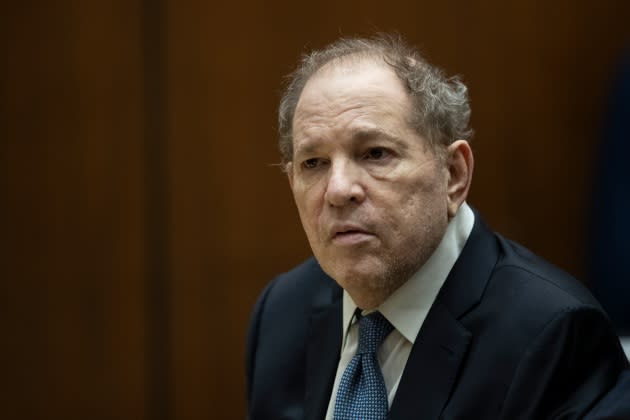Harvey Weinstein Jurors Posed a Question and Asked to Hear Testimony, But Still No Verdict

The jurors in the Harvey Weinstein trial asked a question and sought readback of testimony from the trial last week, court officials confirmed on Tuesday.
The jury has been deliberating for seven days on charges of rape and sexual assault against the producer. There is still no sign of a verdict, and the jury has also not indicated that they are deadlocked.
More from Variety
The jurors concluded for the day around 3:30 p.m. on Tuesday, and are due back Wednesday morning.
Weinstein is facing seven charges stemming from four accusers, including five counts of sexual assault and two counts of rape. The jurors must be unanimous to reach a verdict on each of the counts.
On Dec. 6, the jurors asked the court for readback of testimony, according to a minute order released on Tuesday. The court reporter spent about an hour reading the testimony on Dec. 7. Last Friday, the jury asked a question. The judge conferred with the attorneys on the case by email and responded to the question about an hour later.
The minute order does not state what the question was or whose testimony the jury requested to hear, and the matter was not discussed on the record.
A source informed Variety on Monday that the jury had asked how to handle testimony of a supporting witness — called a “prior bad acts” or “1108” witness under California law — if they do not believe that testimony. It was not clear how many jurors might have been inclined to disbelieve that testimony.
Mark Werksman, one of Weinstein’s defense attorneys, said on Monday that he could not comment on the matter when contacted by Variety.
The 12-person jury, made up of four women and eight men, began deliberating on Dec. 2. They have spent about four-and-a-half hours each day in the jury room. By Tuesday afternoon, the jury had spent over 30 hours deliberating, in total.
Weinstein is facing a maximum of 60 years, if convicted on all counts in this trial. The former Hollywood titan is currently serving a 23-year sentence from his New York conviction in 2020 where he was found guilty of rape and sexual assault. Weinstein, however, is appealing that conviction in New York. If he is convicted in Los Angeles, it’s likely he will spend the rest of his life behind bars; but if he is acquitted, with an appeal on the table, he could possibly walk free. Weinstein has been held at a medical unit of the Twin Towers Correctional Facility since being extradited from New York in July 2021.
Update, Jan. 11: Weinstein was convicted of three counts on Dec. 19. The jury acquitted him of a fourth charge, and hung on three others. After the jury was discharged, the court placed the jury’s questions in the public case file.
On Dec. 6, the jury asked to hear the cross-examination and redirect of Jane Doe #1, “pertaining to her description of Harvey Weinstein’s anatomy.” They also asked to hear testimony of Jane Doe #2 “pertaining to events in the bathroom during the alleged assault.”
On Dec. 9, they asked a legal question about how to handle the testimony of the “prior bad acts” witnesses. Those are the four women identified by first name and last initial who testified that Weinstein sexually assaulted them, but whose allegations were not charged. Their testimony was intended by the prosecution to show a pattern of behavior that would support a guilty verdict on the charged offenses.
“If we do not believe that the prosecution has proven the uncharged offenses against a named victim beyond a reasonable doubt, are we to disregard the testimony in its entirety?” the jury asked. “Or are we still allowed to use portions of their testimony to support reasonable doubt?”
In other words, the jury appears to have disbelieved at least one of those women, and some jurors wanted to use that finding to support a “not guilty” verdict on at least one of the charges.
The jury instructions do not allow that. If jurors do not believe the “prior bad acts” testimony, they are supposed to disregard it completely. Judge Lisa B. Lench referred the jury to the portion of the jury instructions that spells that out.
Finally, on Dec. 14, the jury asked to hear the testimony of Jennifer Siebel Newsom, known in court as Jane Doe #4, “pertaining to the events in the hotel room on the date of the alleged assault.”
On Dec. 19, the jury foreman advised the court that they were divided on three of the charges. They were also split on a misdemeanor version of Count 5, after having acquitted Weinstein of the felony version.
“We have had movement on votes, but not on the last vote,” the foreman reported. The verdict was taken shortly thereafter.
Best of Variety
Sign up for Variety’s Newsletter. For the latest news, follow us on Facebook, Twitter, and Instagram.
